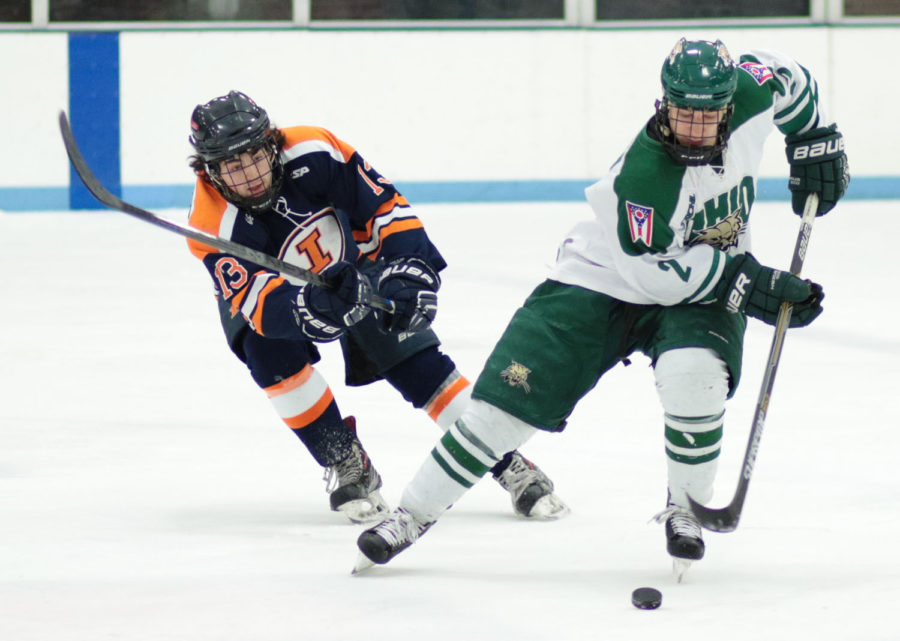Illinois hockey fails to carry momentum from Saturday’s hot start
Illinois’ James Mcging attempts to steal the puck from Ohio’s Tyler Pecka during the CSCHL semifinals against Ohio at the Ice Arena on Saturday. Illinois lost 5-3 despite taking a 2-0 lead in the first period.
February 24, 2015
In the first period of Saturday night’s 5-3 loss against Ohio, the Illinois hockey team did something it hasn’t done in a while.
In their past five games, the Illini have fallen behind three times to opponents in the first period. In the CSCHL semifinal, however, Illinois jumped out to a 2-0 lead to end the first 20 minutes. Head coach Nick Fabbrini said it was one of the best first periods of hockey Illinois has played in a long time.
“We talked about coming out flying and taking advantage of the fact that we played last night and they had a long bus ride and came in late last night,” Fabbrini said. “That was really encouraging.”
In Saturday’s first period, Illinois converted twice on 12 shot attempts and Ohio was unsuccessful on its 11 shots.
Despite its impressive first period, Illinois quickly fell flat. Ohio responded, scoring five unanswered goals.
Get The Daily Illini in your inbox!
Fabbrini thought the Illini became distracted with the officiating and Ohio players and lost focus on the game.
“We didn’t come out with the same energy, the same intensity that we had in the first,” Fabbrini said. “We basically just stopped playing and stopped doing all the things that we did well in the first period.”
Power play hurts Illini
Over the weekend, Illinois had a total of eight power play chances. The team couldn’t convert on any of them.
Winger James McGing said that the Illini’s power play performance hurt its chances to win Saturday’s contest against the Bobcats.
“We didn’t score on any of our power plays so that’s a difference right there,” McGing said. “Special teams really killed us.”
In Illinois’ 2-1 win against Iowa State in the quarterfinal Friday, the Cyclones were unsuccessful on two power play opportunities, but on Saturday, the Bobcats were able to convert six power plays into two goals.
After Saturday’s game, Fabbrini stressed the importance of killing penalties.
“We gave up two power-play goals today and had three or four other penalties that are easily avoided,” Fabbrini said. “When you take penalties, you have to be able to kill them.”
Illinois adjusts to different overtime period
ACHA regular season overtimes consist of a five-minute sudden-death period to decide the winner. If neither team scores in the overtime period, the game goes to a shootout.
During playoffs, the format is different. If teams are tied after regulation, there is a 15-minute intermission followed by a 20-minute sudden-death overtime period. The 20-minute overtime sessions continue until one team scores.
Friday, Illinois and Iowa State experienced the different overtime format and Fabbrini utilized the intermission before overtime to strategize.
“The goal we talked about was anytime we had a chance to get pucks to the net, they had to go on net,” Fabbrini said. “Pucks had to go out of our zone, and we really had minimize our mistakes.”
The strategy worked as forward Matthew Flosi passed the puck to front the net and it deflected off Iowa State’s goaltender and went in early in the overtime period to beat Iowa State 2-1.
“I saw Eric Saulters in front and just tried to get it to him,” Flosi said. “I was standing behind the net hoping it went in somehow.”







